Best Photo Organizer for Windows PC: Top 11
Capturing moments is easy, but organizing moments? That's where the real challenge lies. In the digital age, our photo collections grow rapidly, often becoming unwieldy and disorganized. That's why finding the perfect photo organizer becomes essential.
In this article, we will help you find the best photo organizer for Windows. Whether you're a professional photographer, a hobbyist, or just someone who loves keeping memories in order, we've curated a list of the 11 tools to streamline your photo management.
1. Icecream Photo Editor
Icecream Photo Editor is the ultimate way to organize your photos on Windows computers. Featuring a user-friendly interface and advanced capabilities, this program is essential for storing your digital albums.
With basic functions like resizing and cropping images, as well as more advanced tools like color correction and filters, this Windows photo viewer offers a complete set of options. These tools allow users to fine-tune their photos to perfection before organizing them.
This photo manager software lets you to search through your photos, making it simpler to locate and sort them. Users can easily access and view metadata embedded within their photos. It is also possible to delete unwanted photos directly from the program, streamlining the decluttering process.

Plus, the photo organizer enables you to print your photos directly from the application. Whether you're creating physical albums or printing individual snapshots, this feature ensures seamless integration between digital and physical photos.
The photo organization software supports a variety of image formats, including JPEG, PNG, TIFF, BMP, GIF, RAW, ICO, and SVG.
Ultimately, Icecream Photo Editor offers an effortless solution for organizing the photos on Windows. Its comprehensive features and user-friendly interface make it the best way to organize the digital photos for all photography enthusiasts. So why wait? Download it now and give your photo library the organization it deserves!
2. Adobe Bridge
A popular option among photographers, designers, and creative professionals, Adobe Bridge offers powerful features for organizing your photos. It integrates smoothly with other Adobe software like Photoshop and Lightroom, making it a favored option for those who use these applications.
With this program, you can easily view, sort, and organize your photos in one central location. The interface is intuitive and user-friendly, making navigation and finding the tools you need effortless. Plus, it allows you to customize the layout to fit your specific preferences.
What sets this Windows photo organizer apart is its proficiency in organizing and managing extensive photo collections. It has the capacity to handle thousands of images at once without slowing down or crashing. As a result, it becomes a time-saving tool for those who have a large volume of photos.
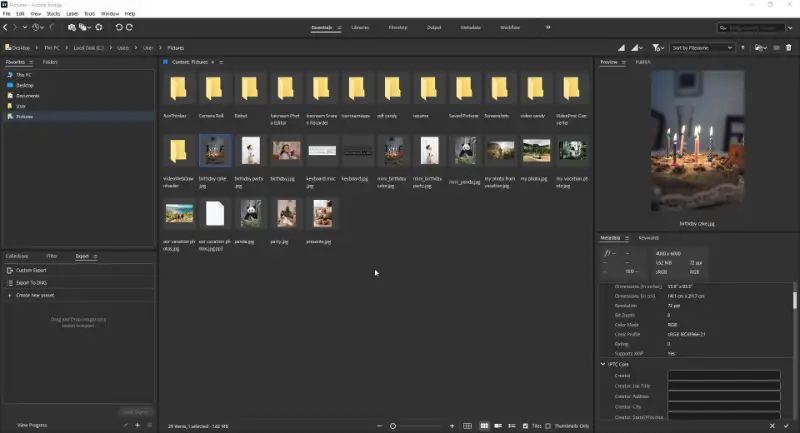
Users can perform batch operations on their photos, such as renaming, batch resizing, and converting files to different formats. This saves time and effort when managing and organizing large collections of images.
In addition, the software to organize the photos provides advanced search capabilities for easily locating particular images using keywords, tags, or metadata. As a result, it is simple to find a specific image in your collection.
Overall, Adobe Bridge is a necessary tool for those wanting to systematically sort through their collection of images. The combination of its user-friendly interface, powerful features, and compatibility solidifies it as the go-to selection for photo organization.
3. Photos
Photos is a built-in application in the Microsoft Windows operating system that serves as an image organizer. Featuring an intuitive interface, it is the perfect choice for effectively managing all your photos.
Users can easily browse through pictures using intuitive navigation controls such as arrow keys or mouse gestures. The search function also enables you to easily locate particular images through the use of keywords or dates.
The program serves as an automatic photo organizer and can sort images based on multiple criteria such as date taken, location, and tags. This makes it easier for users to find specific files without manually sorting through their entire collection.
While not as robust as dedicated photo editor, this photo organizer for Windows offers basic tools to enhance images. Users can make adjustments to brightness, contrast, and color balance, and apply simple filters to improve the appearance of their photos.
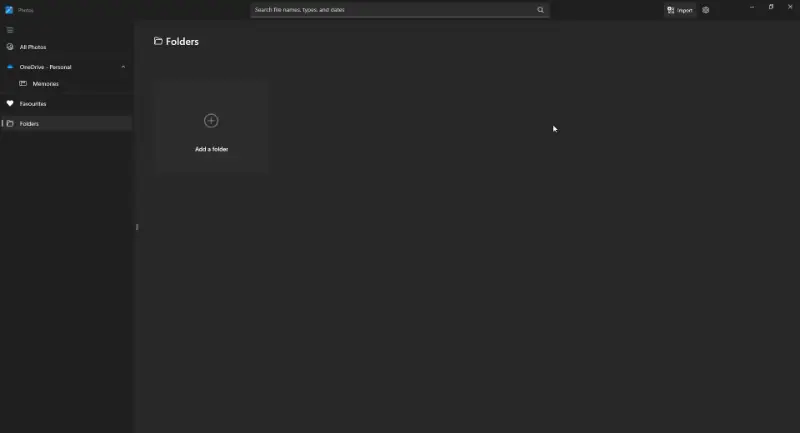
It also allows users to create slideshows with their photos, complete with customizable transition effects and background music. This feature is useful for showcasing photos to friends and family or creating multimedia presentations.
Overall, Photos offers a convenient solution for organizing and managing digital photo collections on Windows devices. Its simplicity and integration with the Windows ecosystem make it a practical choice for basic photo management and viewing needs.
4. Google Photos
Google Photos is a versatile cloud-based photo storage service.
This online image organizer automatically backs up photos and videos from connected devices to the cloud, ensuring that your memories are securely stored and accessible from anywhere with an internet connection.
The service organizes photos and videos chronologically and by location, making it easy for users to browse through their memories based on when and where they were captured.
Google Photos can automatically organize your photos based on people, places, and things. It uses advanced facial recognition technology to group photos, making it simplifies the process of locating all your pictures of a loved one in one place.
The intelligent search function of photo organizer allows you to find specific photos by simply typing in keywords or even describing what's in the image.
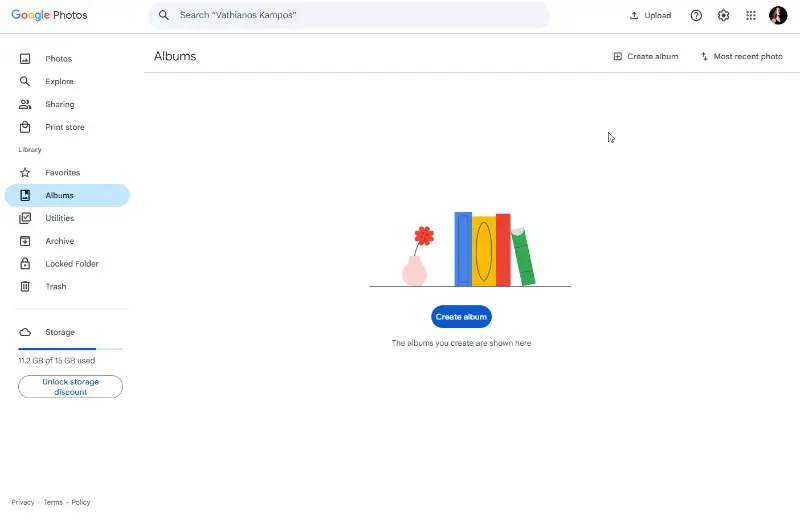
Furthermore, it is possible to generate collages, animations, and short clips with ease using built-in editing tools.
The image organizer and viewer offers free unlimited storage for photos and videos. This means you can free up space on your devices without compromising on the quality of your images. You can access all your photos from any device with an internet connection.
Overall, Google Photos is a game-changer when it comes to online photo organization. With its ease of use, advanced features, and unlimited storage, it's no wonder why so many people are choosing it as their go-to platform for managing their visual memories.
5. Adobe Lightroom
Adobe Lightroom is a professional-grade software to edit and organize photos. It is widely used by photographers, both amateurs and professionals, for its robust features that cater to various aspects of photo management and editing.
At its core, this program to organize your photos on computer is a digital asset management system. It allows you to import, organize, edit, and export your images without ever leaving the program. You can spend more time perfecting your photos and less time navigating between different applications.
Users can create collections and smart collections to group related photos together based on specific criteria such as keywords, metadata, or editing status. Smart collections automatically update using preset rules, making it easy to organize and access photos dynamically.
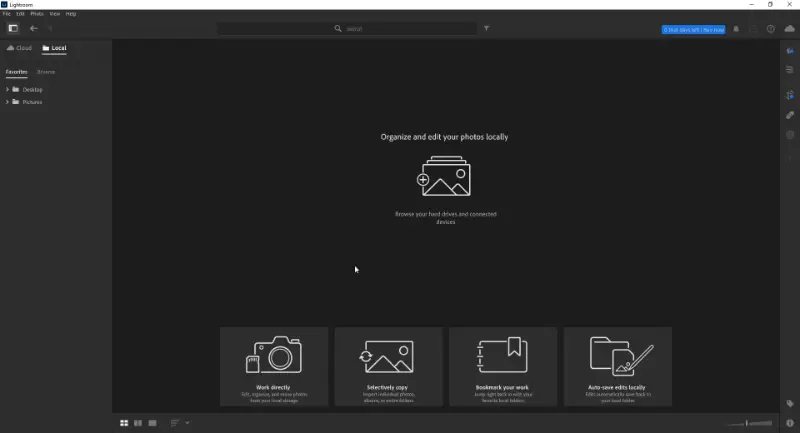
One of its key features is its non-destructive photo editing capabilities. This means that any changes you make to your photos are saved separately from the original file. You can experiment with different edits without fear of with an opportunity to always go back to the initial image.
Thanks to its integration with Adobe Creative Cloud, the program allows for seamless collaboration and syncing across multiple devices. This means you can start editing on your desktop and continue on your laptop or even your phone.
In conclusion, Adobe Lightroom is a great photo organizer for Windows users. The user-friendly design, robust editing capabilities, and advanced organization options of this program make it a good choice for photographers.
6. Excire Foto
Excire Foto is an innovative photo organization software designed to help users efficiently manage and organize their digital photo collections.
This Windows photo organizer utilizes an advanced artificial intelligence (AI) algorithm to automatically analyze, categorize, and tag photos based on their content. It employs state-of-the-art AI algorithms to analyze objects, scenes, colors, and patterns in the photo.
Using its AI capabilities, this image organizer assigns descriptive keywords and tags. These tags make it easy for users to search for specific images later.
You no longer have to spend hours manually sorting through your files. A quick click or two is all it takes to find the specific photo you're seeking, whether it's a landscape shot or a picture of your furry friend.
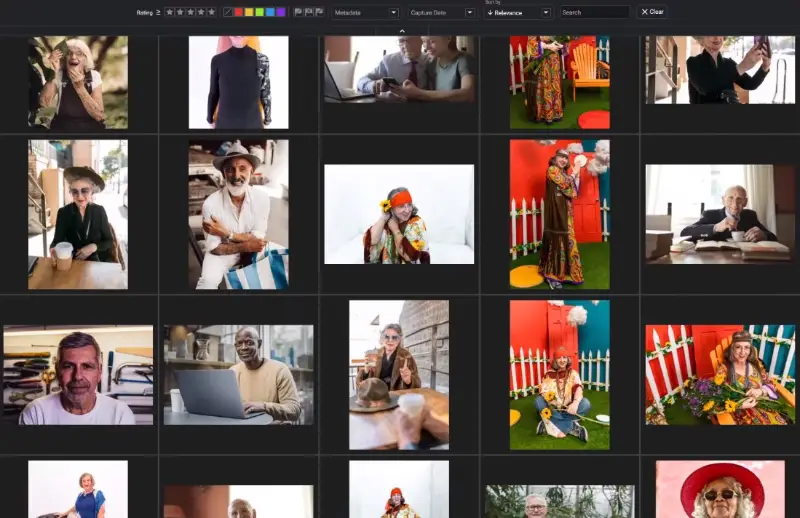
An outstanding aspect of this photo organization app is its aptitude for detecting faces in your pictures. This allows you to easily group and organize your photos by individuals, making it perfect for creating family albums or keeping track of models in a photography project.
Plus, the program can identify visually similar photos within a collection, helping users find duplicates or near-duplicates that may clutter their library. This feature allows users to review and manage their photo collections more efficiently.
This image organizer seamlessly integrates with Adobe Lightroom, letting users to leverage its powerful organization and search capabilities within the editing software. Users can sync their Excire Foto keywords and tags with Lightroom's metadata, providing a unified solution for photo management.
Excire Foto is a good photo organizer for Windows users looking to manage their image collection and optimize their workflow. Say goodbye to the hassle of manual organization and hello to an efficient and organized photo library.
7. Zoner Photo Studio
Zoner Photo Studio(https://www.zoner.com/) is an extensive photo management software. It offers a wide range of features designed to help users organize, edit, and share their digital collections.
With this image organizer, you can easily import photos from your camera, smartphone, or any other device. The user-friendly interface allows you to create folders and subfolders to categorize your photos based on date, location, event, or any other criteria you choose.
In addition to basic photo editing tools like exposure adjustment, cropping, and color correction, the program offers a range of advanced editing tools for more precise control over image adjustments. These include layers, masks, retouching tools, and filters.
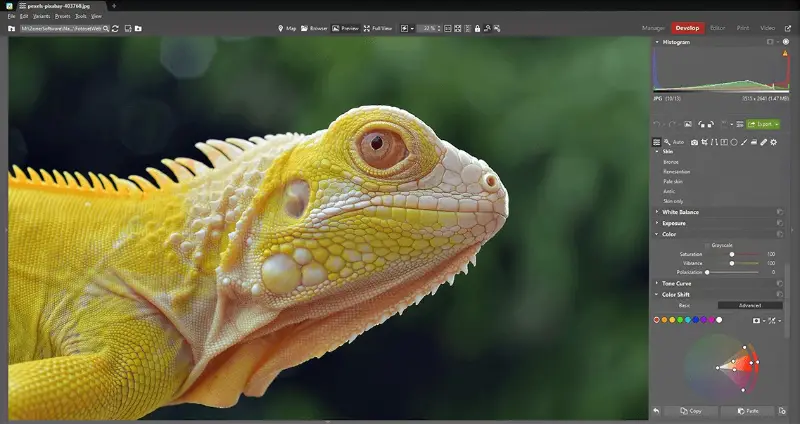
The ability to process multiple images at once sets it apart. With just a few clicks, you can apply edits or add watermarks to multiple photos at once, saving you valuable time and effort.
If your photos contain GPS location data, the app can automatically plot them on a map. This allows you to visualize where each image was taken. The feature is especially useful for travel photographers or anyone interested in geotagging their images.
Overall, Zoner Photo Studio is a versatile and user-friendly solution to organize various photos on your laptop or computer. Whether you're a hobbyist looking to improve your photography management or a professional photographer needing powerful tools, this app has you covered.
8. FastStone Image Viewer
FastStone Image Viewer is a lightweight yet powerful software designed to help users manage, view, edit, and organize their photo collections efficiently.
This photo organizer provides a fast and responsive interface for viewing images in various formats, including popular ones like JPEG, PNG, TIFF, and RAW files from many camera manufacturers. It offers smooth navigation through files with support for zooming, panning, and full-screen mode.
The photo manager software enables the creation of folders, adding tags, and rating images for easy categorization and sorting.
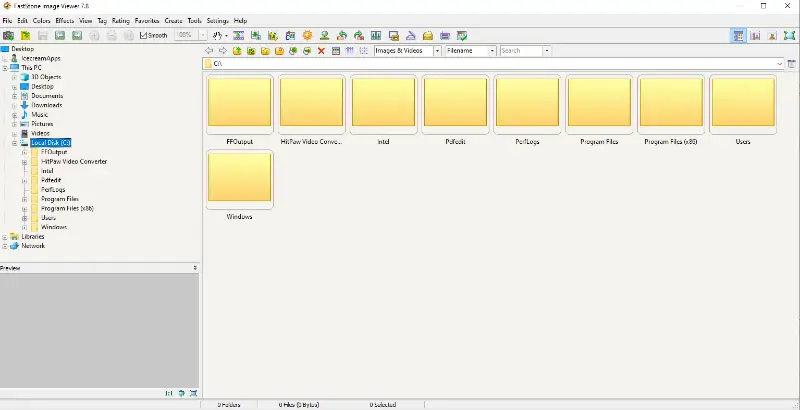
Users can create dynamic slideshows with customizable transition effects, background music, and captions. This feature is handy for showcasing your photos to family and friends or creating presentations for professional purposes.
This image viewer allows users to compare multiple pictures side by side. It makes it easier to choose the best shot from a series or identify differences between similar photos. This feature is especially useful for photographers who need to select the top images from a photo shoot.
But that's not all – the software to organize your photo collection also offers a variety of editing tools, allowing you to enhance your photos right within the software. You can adjust brightness, contrast, and color levels, as well as crop and resize your images.
Overall, FastStone Image Viewer is a user-friendly photo organization tool for managing and organizing photo collections. Its combination of essential features, intuitive interface, and fast performance makes it a popular choice among photographers and casual users alike.
9. Phototheca
Phototheca is a comprehensive photo management software designed to streamline the organization, storage, and editing of digital image collections.
With its user-friendly interface, this image organizer allows you to easily sort and categorize your files. You can simply drag and drop your photos into albums or use the powerful search function to pinpoint specific images.
You can create customizable albums, tag images with keywords and labels, and assign ratings to prioritize your favorite photos.
Additionally, it provides advanced features such as facial recognition, geotagging, and duplicate photo detection. This means you can quickly find all photos of a particular person or location, and easily delete any duplicates taking up valuable storage space.
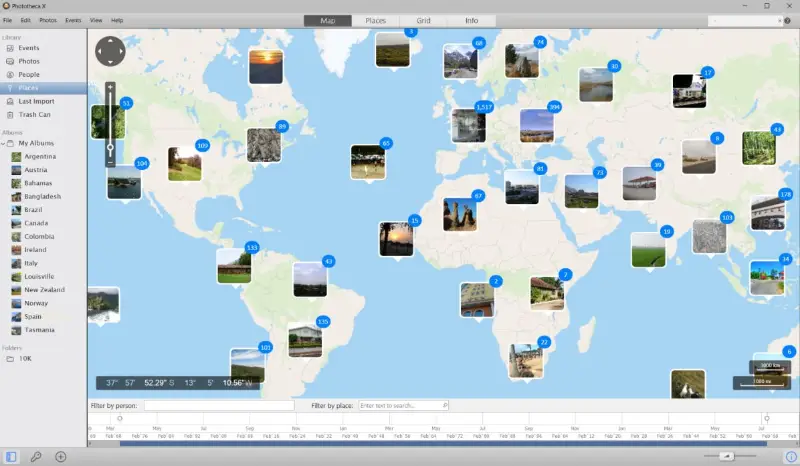
The photo organizer for Windows automatically organizes photos by date, making it easy to browse and locate images chronologically. It has a built-in timeline feature, allowing you to relive your memories in a more organized way.
Users can back up their photos to external drives or cloud storage services. It is possible to sync the photo library across multiple devices for seamless access anywhere, anytime. Moreover, with the help of its cloud storage integration, you can conveniently access your photos on any device, at any moment.
Overall, Phototheca is a user-friendly solution for organizing, managing, and sharing digital photo collections. Its intuitive interface, advanced organization tools, and emphasis on privacy and security make it a valuable tool for photographers and casual users alike.
10. MAGIX Photo Manager
MAGIX Photo Manager is a robust photo organization software designed for efficient management, editing, and sharing of your digital image collections.
Users can easily import photos from cameras, smartphones, and other devices, organizing them into customizable folders and albums. The program automatically sorts images by date, location, and other metadata, simplifying the process of finding specific photos.
The Windows photo organizer provides a suite of editing features for enhancing images, including adjustments for brightness, contrast, color balance, and sharpness. You can also apply filters, crop photos, remove red-eye, and correct lens distortion, allowing for creative expression and refinement of photographs.
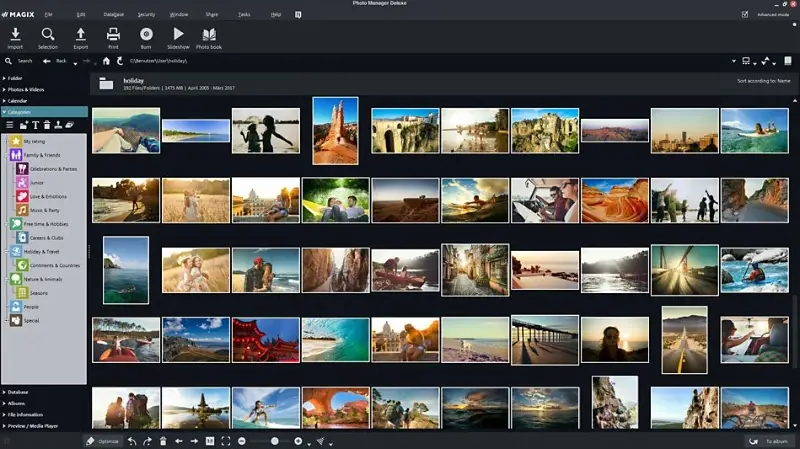
An important aspect of this photo organization software is its face recognition technology. This feature streamlines the process of locating photos of specific individuals within your collection. It automatically detects faces and enables you to tag them with names.
Users can access their photos on the go with the built-in support for cloud storage synchronization. This keeps all your images within reach no matter where you are. Plus, it has a backup feature that ensures your precious memories are safe and secure.
Overall, Magix Photo Manager is a versatile tool for organizing, editing, and sharing digital photographs. It offers a range of features to suit the needs of photographers and enthusiasts alike. Its intuitive interface and powerful functionality make it a valuable asset for anyone looking to organize their photo collection effectively.
11. digiKam
digiKam delivers efficient handling of vast photo collections through a streamlined database design that ensures smooth operation even with heavy workloads.
It enables detailed metadata manipulation and consistent synchronization across XMP, IPTC, and EXIF formats. The application utilizes AI-powered facial detection to automatically recognize and label subjects, refining results as usage continues.
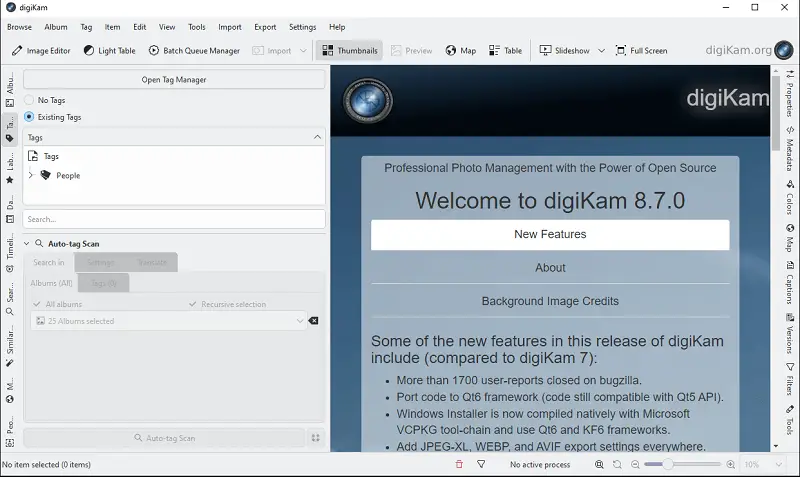
Location-based capabilities include accurate GPS modification and dynamic map displays for intuitive spatial sorting. Compatibility with numerous RAW file types spans a broad selection of camera brands, while its suite offers reversible adjustments that maintain original visuals.
Connectivity with network drives and cloud services supports organized storage and data backup. digiKam's flexibility and reliable performance make it a valuable tool for managing vast footage archives.
Tips for using photo organizers efficiently
- Stay consistent. Develop a system for naming your photo files that includes relevant details like date, event, or location. Consistency in naming conventions makes it easier to search for specific photos later.
- Use folders and subfolders. Create a hierarchical folder structure to categorize your files. Organize them by year, month, event, or subject matter, depending on your preferences and needs.
- Metadata and tags. Take advantage of metadata and tagging features available in photo management software. Add keywords, descriptions, and tags to your images to make them easily searchable.
- Regular backups. Back up your photo library regularly to prevent the loss of valuable memories. Consider using cloud storage services or external hard drives for reliable backups.
- Delete unwanted photos. Periodically go through your photo collection to delete duplicates, blurry shots, and irrelevant images. This helps keep your library clutter-free.
- Geotag photos. If your camera or smartphone doesn't automatically add a geotag, consider adding location data manually. This can be especially useful for organizing travel photos.
- Utilize face recognition. Take advantage of face recognition technology in photo management software to easily find pictures of specific people.
What is metadata in photo organizers?
Photos are not just images, they contain a wealth of information known as metadata. This includes details such as the date and time the photo was taken, camera settings, and even location information.
Metadata is crucial for organizing and managing large collections of digital files. It enables automatic photo organizers to quickly search, sort, and filter your images based on various criteria.
Accessing and editing metadata on Windows can be done through various methods, including built-in tools and third-party software.
Here's how you can edit metadata using Windows Explorer:
- Right-click on the image file and select "Properties".
- In the "Properties" window, go to the "Details" tab.
- Here, you can view and edit some basic metadata such as title, tags, ratings, and comments.
- To edit, simply click on the field you want to change, make your modifications, and click "OK" to save the changes.
FAQ
- What’s the difference between manual and AI-generated tagging?
- Manual tagging requires you to assign keywords to photos, while AI uses machine learning to identify objects, people, or locations and applies tags automatically.
- How do I manage photos with missing metadata?
- Many photo manager software allow you to manually add or estimate details like date, location, and categories to maintain consistency in sorting.
- What is geotagging, and how do I use it?
- Geotagging assigns location data to your photos. Some organizers let you add or edit this information by using maps for accuracy.
- How do I fix broken links to photos in my organizer?
- If files are moved or renamed outside the software, you can usually re-link them by pointing to the new location.
- How does facial recognition work?
- It uses AI to detect and identify faces in photos. Once trained, it can group photos of the same person for quick tagging and sorting.
- Can image organizers detect corrupted files?
- Advanced tools may flag corrupted files during import or scanning, allowing you to isolate and address them.
- How do organizers handle duplicate photos?
- Many apps come with built-in duplicate detection features that can automatically identify and help delete redundant files.
- Are there lightweight photo organizers for older Windows PCs?
- If you have a less powerful computer, consider tools such as FastStone Image Viewer or XnView MP. These programs offer essential organization features without consuming excessive system resources.
- What are the benefits of using cloud-based photo viewers?
- These platforms enable automatic syncing across devices, provide secure remote access, and often include collaborative features for sharing and editing with others in real time.
Conclusion
In conclusion, selecting the perfect program to organize your photos on a Windows computer is essential for efficient management and storage of your cherished moments. From user-friendly interfaces to advanced photo editing features, these organizers offer something suitable for everyone.
Whether you're a professional photographer or someone interested in sorting your photos, there's a suitable option for you on our list. Remember, the best image management software is the one that seamlessly integrates into your own creative process.


